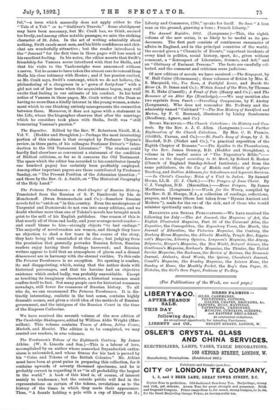The Princess Taralcanova : a Dark Chapter of Russian History.
Translated from the Russian of S. P. Danilevski by Ida de Monchanoff. (Swan Sonnenschein and Co.)—Somehow Russian novels fail to "catch on" in this country. Even the masterpieces of Turgenief and Dostoievski do not run into many editions, and we doubt whether more than one of Tolstoi's novels has brought much grist to the mill of his English publisher. One reason of this is that nearly all of them end badly, and your average novel-reader- and small blame to him—strongly objects "to bad endings." The majority of novel-readers are women, and though they have no objection to shed a few tears in the course of the story, they hate being left unsatisfied at the close ; but judging from the pessimism that generally pervades Russian fiction, Russian readers enjoy having their feelings harrowed ; and Russian writers appear to hold that an atmosphere of gloom and a dismal denouement are in harmony with the eternal verities. To this rule The Princess Tarakanova is no exception. Its opening is sombre, its end disappointing, which, seeing that the author deals with historical personages, and that his heroine had an objective existence which ended badly, was probably unavoidable. Except as touching its imaginary characters, a historical romance must confine itself to fact. Not many people care for historical romances nowadays, still fewer for romances of Russian history. To all who do, we can recommend The Princess Taralcanova. It is dis- tinctly interesting, realistic in the best sense, contains highly dramatic scenes, and gives a vivid idea of the methods of Russian government, and the intrigues of the Russian Court in the time of the Empress Catherine.


















































 Previous page
Previous page